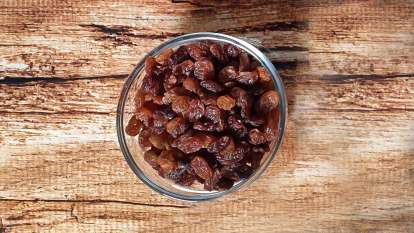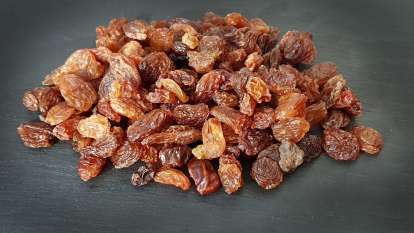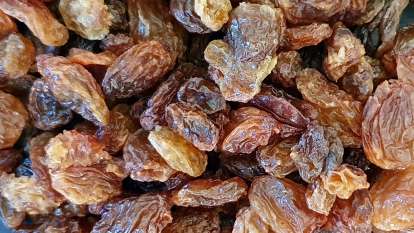Raisins
Raisins - the best and most nutritious dried fruit
Raisins are a real source of good health, especially recommended for students and the elderly, as they improve brain function and prevent memory loss problems, but also for women during pregnancy or lactation, thanks to their high calcium content. They are a powerful ally against anemia and constipation.
Raisins are dried, dehydrated grapes that retain many of the benefits of fresh grapes, plus some lesser-known ones. They're an important source of fiber, vitamins and minerals, and their special sweetness makes them the most loved dried fruit and a recommended healthy snack option for sweet lovers.
Benefits of eating raisins
There are many benefits that are attributed to raisins, including:- An ally against constipation: a benefit we know from our grandparents. The explanation? Their daily, moderate content helps keep the gut healthy, protecting against colon cancer.
- Protects eyesight (including against cataracts): raisins contain phytonutrients that are ideal for eye health over time, improving blood circulation and capillary vessels.
- Strengthens the nervous system: raisins are considered an invigorating food, a real source of minerals and vitamins, especially B vitamins.
- They havea diuretic effect and keep the body functioning well thanks to their potassium content.
- Prevents cramps: also thanks to their potassium content, raisins help keep joints and tendons healthy and prevent cramps.
- Improves blood circulation and protects the heart: raisins are also a great help in improving blood circulation and preventing clots. They also prevent the formation of plaques on the heart walls, which gradually affect the functioning of the heart.
- Staying young and protecting against cancer: raisins are a rich source of antioxidants.
- Good intestinal transit: thanks to their fiber content, which is necessary to eliminate toxins and waste substances from the body.
- Promotes bone remineralization: thanks to their significant calcium and magnesium content, nutrients very important in bone development, raisins have been shown to be useful in preventing the development of osteoporosis and improving joint health.
- Curb appetite: although raisins are said not to be recommended for obese people because of their high calorie content, it has been shown that raisins, eaten in moderation, help to maintain satiety for a long period (thanks to their fiber content).
- Neutralizes acidosis: Acidosis is a condition in which the pH of the blood drops as well as gases in the respiratory system, which can lead to kidney stones, gout, tumours, cancer, arthritis, hair loss or skin diseases. As raisins are rich in potassium and magnesium, they help neutralize the development of these acids.
- Treats anemia and weight gain by providing iron, copper and manganese.
- Helps to care for teeth: one of the compounds in raisins is oleanolic acid, which plays a fundamental role in protecting teeth against decay, sensitivity and tooth fragility. For this reason, eating raisins in moderation helps prevent the growth of the main bacteria responsible for tooth decay and plaque. In addition, thanks to their calcium content, they help prevent damage to tooth enamel.
- Protection against Alzheimer's disease, as raisins are an excellent source of flavonoids, antioxidants and myricetin.
Who are raisins recommended for?
Raisins are recommended for anyone who wants to benefit from the wonder properties listed above, but in particular:- Students and the elderly, as they improve brain function and prevent memory loss problems, thanks to their flavonoid, antioxidant and myricetin content.
- Women during pregnancy or lactation, as these are the periods when calcium needs are greatest.
- People with osteoporosis
- People who are anemic, have problems with eyesight or chronic fatigue.
How many types of raisins are there?
- Thompson raisins: these dry naturally, sometimes for up to several weeks. Brown in color, seedless, Thompson raisins are the most popular raisins on the US market and are grown from Thompson green grapes. They change from green to dark brown during the natural drying process. Thompson raisins are useful for baking, cooking and snacking.
- Sultana raisins: also dried from green Thompson grapes, but produced by a different method of drying. Before drying, the grapes are immersed in a treatment of potassium carbonate, water and olive oil, which intensifies the drying speed. Because they spend longer in the sun, Sultana raisins are lighter in color. They can be eaten raw, roasted or cooked.
- Golden raisins: also made from green Thompson grapes, but treated with sulfur dioxide to prevent the grapes from changing color during the drying process. They are dried under artificial heat and for a short period of time, which gives them a sweet flavor. They are ideal for cooking and baking, but can also be eaten raw.
- Currants: with an intense flavor when put in food, they are especially used in baking (usually bread rolls, buns). They have a very dark color and an intensely sour taste. Its seeds are generally removed before the drying process, unlike other raisins.
- Muscat raisins: larger than regular raisins and also darker in color. They are made from Alejandría, Moscatel grapes with a very sweet flavor. Often the seeds are removed before the drying process. They are mainly used for cooking.
In addition to eating raisins in sweets, food or even raw, you can opt for raisin water, a recipe for flushing the arteries with antioxidant action, reducing cholesterol, triglycerides and thinning the blood.
Now that you know the main health benefits of raisins, all you have to do is introduce their moderate consumption into your daily diet and enjoy their healthy dose, but not before consulting your specialist, especially if you suffer from allergies, obesity or diabetes, as, in addition to the many benefits they offer, a large proportion of the calories they provide come from sugars.
Nutrition facts raisins per 100 g
- Energy: 302 kcal
- Fast absorbing carbohydrates: 79.18
- Fiber: 4
- Carbohydrates: 59.19
- Fat: 0.46
- Protein: 3.39



Comments